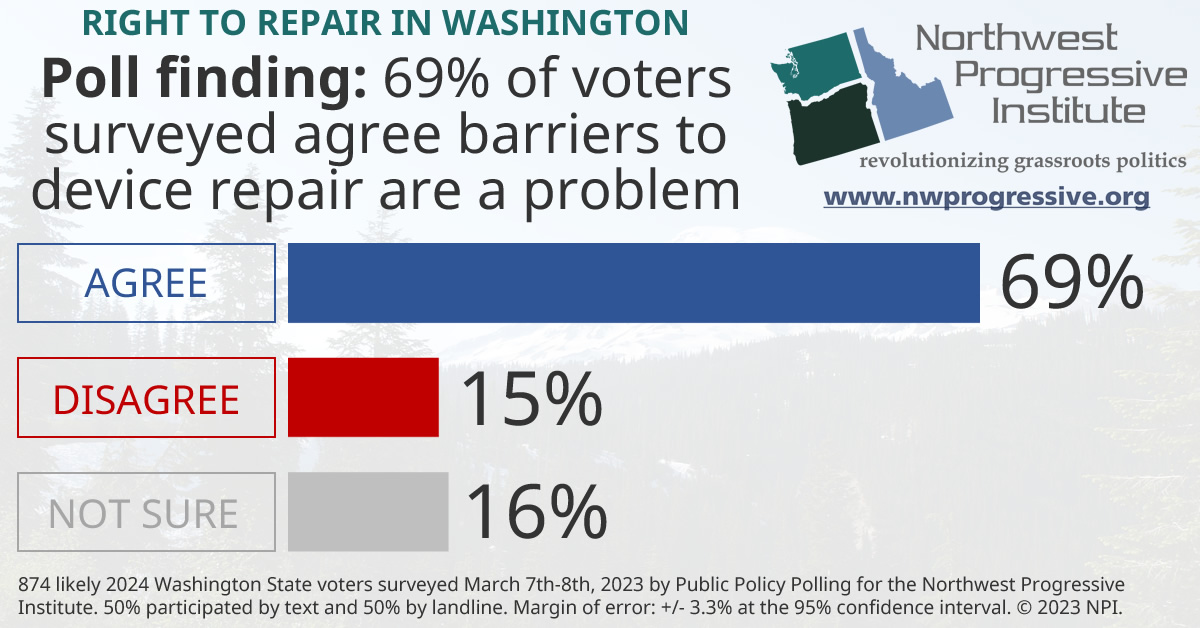Voters in Washington State are in overwhelming agreement that the practice of many large electronics manufacturers to restrict access to the necessary parts and information to make repairs on phones and laptop computers is a problem, the Northwest Progressive Institute’s most recent statewide survey has found.
69% of 874 likely 2024 Washington State voters interviewed by Public Policy Polling earlier this month said that they agreed that the planned obsolescence business practices of firms like Apple and Samsung were a problem, with only 15% disagreeing and 16% not sure. The percentage of those in agreement perfectly matches the percentage we’ve previously found in support of right to repair legislation in Washington State, demonstrating strong and sustained support.

This morning, the Senate Environment, Energy & Technology Committee heard House Bill 1392, prime sponsored by Representative Mia Gregerson (D‑33rd District: South King County). As summarized by nonpartisan staff in the House of Representatives, HB 1392 “requires manufacturers of digital electronic equipment [but not cars and medical devices] to make available to independent repair providers (IRPs) certain parts, tools, and documentation on fair and reasonable terms for the diagnosis, maintenance, and repair of digital electronic equipment.”
HB 1392 — dubbed the Fair Repair Act for short — passed the House on a vote of 58–38 on March 4th. It must receive a “do pass” recommendation from the Senate Environment Committee by March 29th to remain active this session.
Prior to HB 1392’s consideration in the Senate, we wanted to find out if voters in Washington agree or disagree with right to repair proponents that this legislation addresses a real problem that people are having with their electronics.
So we asked this question and got these responses:
QUESTION: Electronics manufacturers like Apple and Samsung have a history of restricting access to the necessary parts and information to make repairs on phones and laptop computers. Do you strongly agree, somewhat agree, somewhat disagree, or strongly disagree that this is a problem?
ANSWERS:
- Agree: 69%
- Strongly agree: 45%
- Somewhat agree: 24%
- Disagree: 15%
- Somewhat disagree: 9%
- Strongly disagree: 6%
- Not sure: 16%
Our survey of 874 likely 2024 Washington State voters was in the field from Tuesday, March 7th through Wednesday, March 8th, 2023.
The poll utilizes a blended methodology, with automated phone calls to landlines (50%) and online answers from cell phone only respondents (50%).
It was conducted by Public Policy Polling for the Northwest Progressive Institute, and has a margin of error of +/- 3.3% at the 95% confidence interval.
NPI Legislative Director Kathy Sakahara testified in support of HB 1392 this morning, presenting this research and noting that voters have been consistent. What’s also remarkable, in addition to the consistency of support, is that right to repair is a bipartisan cause — not a dynamic we see for every issue. Majorities of Republicans, independents, and Democrats all agree that manufacturers restricting access to parts and information needed to make repairs is a problem.
Breakdown by party and region
By party affiliation: 53% of Republican voters agree that electronics manufacturers’ history of restricting access to parts and information is a problem, joined by 68% of independents and 78% of Democratic voters.
By region: 63% of voters surveyed in Eastern and Central Washington also agree, joined by 73% of voters surveyed in the Olympic Peninsula and Southwest Washington. These are the rural areas of our state, and folks there understandably want to keep their gear in good working order, whether that’s an Apple iPhone or a tractor from John Deere. Urban and suburban voters agree too: 71% in King County, 71% in North Puget Sound, and 70% in the South Sound.
People should be able to get their broken devices fixed
During today’s hearing, a number of industry spokespeople argued that right to repair legislation would be problematic from a cybersecurity and privacy perspective. For the record, they’re wrong. Making it easier for people to get their devices repaired does not increase any cybersecurity or privacy risks to users.
Most computers and mobile devices, including those sold by Apple and Samsung, offer built-in strong encryption. Users should have that encryption turned on to protect their data in case of device loss or theft at all times. No encryption means your data is at risk, including from technicians who work for the very same companies employing lobbyists to oppose this right to repair legislation.
It’s understandable that people want to be able to fix their devices when they break, and they should be able to. The industry representatives who spoke today neglected to mention that companies like Apple have policies in place that prevent their employees from helping someone who comes into a retail store with a broken product that is past its “lifecycle” but could still work if it was repaired.
Cupertino even mandates that Apple Stores get rid of the tools required to open up and work on older products (iMac, iPhone, iPad, etc.) and Apple employees are not authorized to do any repair work on older products for “liability reasons.”
Accordingly, if an Apple product is too old to be eligible for service at an Apple Store, Apple employees will tell a customer that their only recourse is to go to an independent repair shop and get help there. Yet, those same independent repair shops struggle to get the parts and information necessary to help people who want their devices, old or new, restored to good working order.
We can improve this sorry state of affairs and reduce electronic waste by adopting HB 1392. Washingtonians want the Fair Repair Act. They want to be able to fix their things, and our laws should empower them to be able to do so.

